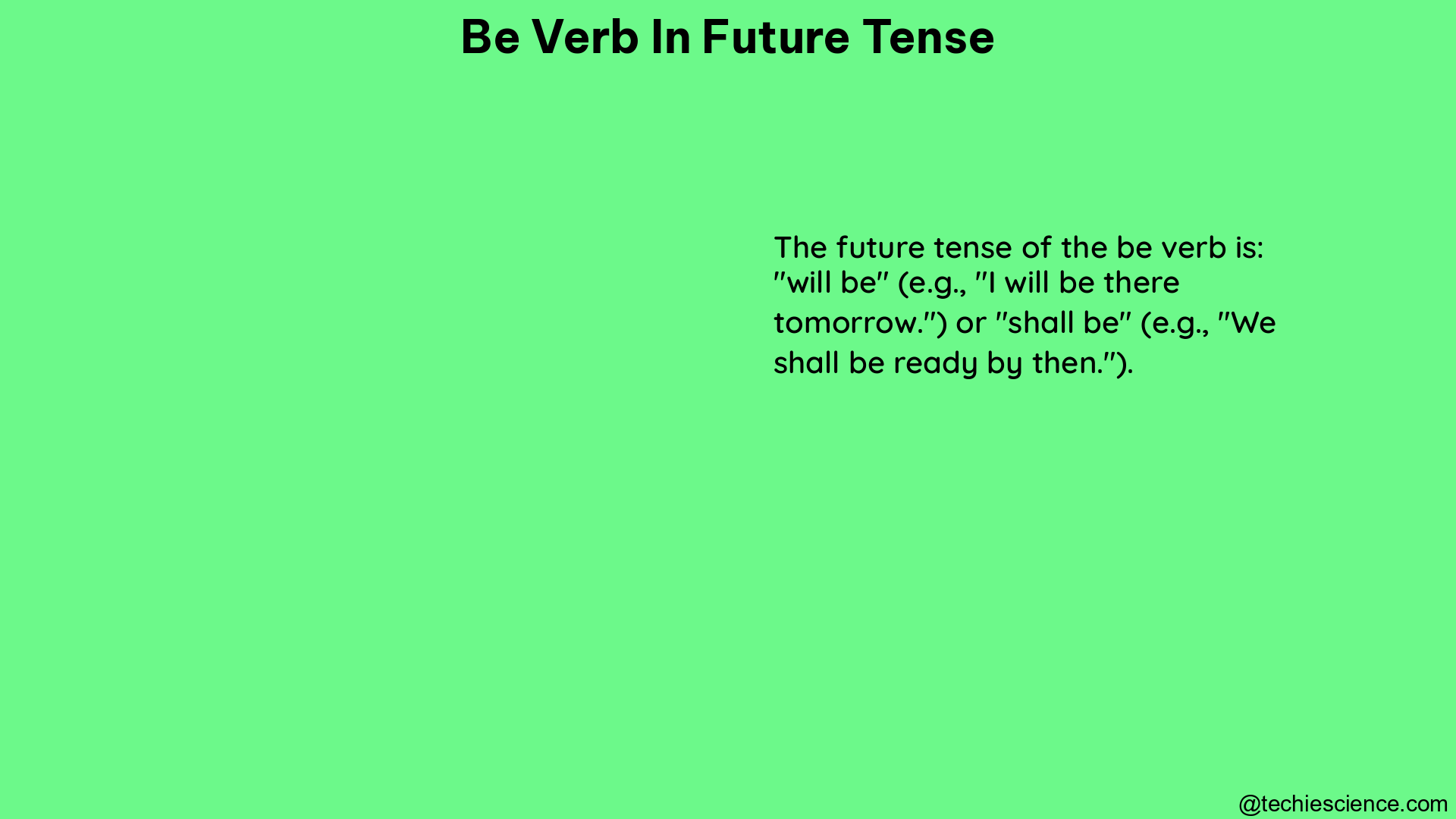The “be” verb in the future tense is a crucial aspect of English grammar, used to describe a state or condition that will exist at a specific time in the future. This comprehensive guide will delve into the various forms, examples, and common mistakes associated with the “be” verb in the future tense, providing you with a thorough understanding of this essential grammatical concept.
The Different Forms of the “Be” Verb in the Future Tense
The “be” verb in the future tense is typically formed using the auxiliary verb “will” and the base form of the verb “be.” Here are the different forms:
| Person | Affirmative Form | Negative Form |
|---|---|---|
| I | I will be | I will not be (I won’t be) |
| You | You will be | You will not be (You won’t be) |
| He/She/It | He/She/It will be | He/She/It will not be (He/She/It won’t be) |
| We | We will be | We will not be (We won’t be) |
| They | They will be | They will not be (They won’t be) |
Affirmative Form Examples
- I will be at the office tomorrow.
- You will be feeling much better after the treatment.
- She will be a successful entrepreneur in the future.
- We will be celebrating our anniversary next month.
- They will be traveling to Europe for their vacation.
Negative Form Examples
- I won’t be able to attend the meeting today.
- You won’t be staying for the entire event.
- He won’t be available to help with the project.
- We won’t be going on the field trip this semester.
- They won’t be participating in the sports competition.
Interrogative Forms of the “Be” Verb in the Future Tense

The interrogative forms of the “be” verb in the future tense are used to ask questions about a future state or condition. Here are the different interrogative forms:
| Person | Interrogative Form |
|---|---|
| I | Will I be? |
| You | Will you be? |
| He/She/It | Will he/she/it be? |
| We | Will we be? |
| They | Will they be? |
Interrogative Form Examples
- Will I be able to finish the project on time?
- Will you be available for the meeting next week?
- Will she be selected for the leadership program?
- Will we be traveling to the conference together?
- Will they be joining us for the celebration?
Using Time Adverbs with the “Be” Verb in the Future Tense
The “be” verb in the future tense is often used in conjunction with time adverbs to specify when the action or state will occur. Some common time adverbs include “tomorrow,” “next week,” “next month,” “next year,” and “soon.”
Examples with Time Adverbs
- I will be at the gym tomorrow.
- You will be in London next week.
- She will be on vacation next month.
- We will be at the beach next year.
- They will be here soon.
Common Mistakes with the “Be” Verb in the Future Tense
It’s important to be aware of common mistakes that can occur when using the “be” verb in the future tense. Here are a few examples and their correct forms:
Incorrect:
- I will be at the party tomorrow, but I will not be there.
- She will be a doctor next year, but she will not be a doctor.
Correct:
- I will be at the party tomorrow, but I won’t be there.
- She will be a doctor next year, but she won’t be a doctor.
Mastering the “Be” Verb in the Future Tense
Proficiency in using the “be” verb in the future tense is essential for effective communication in English. By understanding the different forms, examples, and common mistakes, you can confidently express your thoughts and intentions about future states and conditions.
Remember to practice regularly, pay attention to the use of time adverbs, and be mindful of the correct negative and interrogative forms. With consistent practice and a solid grasp of this grammatical concept, you’ll be well on your way to mastering the “be” verb in the future tense.
References
- YouTube. (2022). To Be – Future Tense. Retrieved from https://www.youtube.com/watch?v=WotHYJryrco
- Grammarly. (2024). What Is the Simple Future Tense? Definition and Use. Retrieved from https://www.grammarly.com/blog/simple-future/
- Ginger Software. (n.d.). The Future Tense. Retrieved from https://www.gingersoftware.com/content/grammar-rules/verbs/the-future-tense
- LANGUAGE ON Schools. (n.d.). Verb To Be: Present, Past, & Future. Retrieved from https://languageonschools.com/free-english-lessons/verb-tenses/verb-to-be-present-past-future/
- YourDictionary. (2022). What Are Future Tense Verbs? Meaning and Usage. Retrieved from https://www.yourdictionary.com/articles/future-tense-verbs

Hi…..I’m a graduate with a Bachelor’s degree in English Literature. I wish to do a Masters in the same field someday and continue my career in Academia.
Let’s connect through LinkedIn: